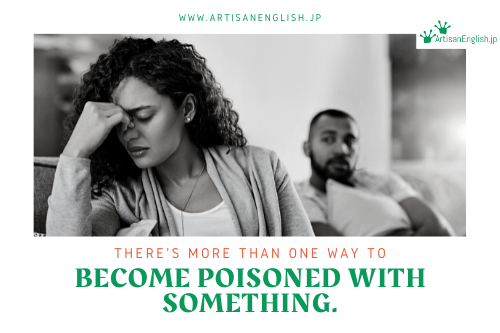
YouTube / iTunes / Spotify / Radio Public / Pocket Casts / Google Podcasts / Breaker / Overcast
Listen to ArtisanEnglish.jp posts & lesson intros here.
Idiom: Become poisoned with (something)
I will go out on a limb here and assume you know what it means to poison something.
If a living thing ingests a dangerous chemical, it will become poisoned with it.
That’s pretty straightforward and nothing new for you.
However, did you know you can poison a relationship?
Ah-ha! Now we are learning something new, I see.
Well, you can poison a relationship by doing something to damage it or make it unpleasant to continue.
Step out on your husband or wife, for example, and you run the risk of poisoning your relationship.
No one dies, hopefully, but the trust essential for a good relationship will never be as strong – the relationship has been poisoned.
That’s two meanings related to becoming poisoned with something, yet there is still more.
Where I come from people, use it in another way.
My father often became poisoned with something, and he didn’t have to drink it for it to have an effect.
In Newfoundland, when you become poisoned with something, you have lost all interest in it because someone is taking advantage of you, being dishonest or otherwise not doing what they should be doing.
As I said, my father became poisoned with things all the time.
At least once a week, he would become poisoned with politics and swear never to vote for so-and-so again because they were a g.d. idiot.
Often he would try to help the younger guys at work, but if they rewarded his efforts not by working hard but by showing up drunk or late, he would say something like, “I’m poisoned with him now. I’ll never help him again!”
You see, language usage is not only what you find in the dictionary; it’s also what you find in daily life.
That’s just the way language is.
Please don’t become poisoned with it.
Flesch-Kincaid Readability Test
This post is understandable by someone with at least a 7th-grade education (age 12).
On the Flesch-Kincaid reading-ease test, this post scores 73.
The easier a passage is to read, the higher the score on a scale of 0 – 100.

